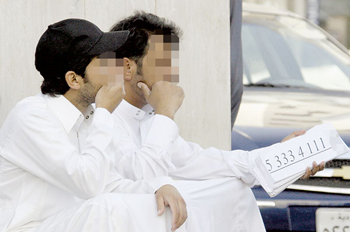 Jeddah, Jul 26: Despite strict regulations, street vendors in the Kingdom are still selling SIM cards of all major mobile firms without customers providing proof of identity.
Jeddah, Jul 26: Despite strict regulations, street vendors in the Kingdom are still selling SIM cards of all major mobile firms without customers providing proof of identity.
According to regulations, buying and charging a SIM card requires a customer to provide an identity number. The regulations were introduced to prevent misuse and criminal activities.
A seller, Abdul Rahman, told Arab News that SIM cards without ID numbers cost between SR50 and SR1,500, depending on the uniqueness of the number sought by the customer. An expatriate can have as many as 10 different SIM cards while a Saudi citizen can have 20 numbers.
“People can buy SIM cards from us without producing any document. Those who want to register their SIM cards on their name are welcome to do so, but if someone doesn’t have an ID or doesn’t want to buy the SIM on his ID, we can provide the person with a SIM card without any problem because the seller himself will provide the ID number,” he said.
When asked whose ID numbers are used, Abdul Rahman said it could be anyone and buyers need not worry about this. “We have cards with different ID numbers written on them for customers who don’t have iqama numbers or others who don’t want to use their own iqama number,” he said.
If anyone wants to register the SIM with his ID number, the street vendor does that too by forwarding a message to the mobile phone company along with a photocopy of the ID card.
Abdul Rahman said there is no danger of being caught out by the mobile phone firms. “Anyone can get any SIM card from us without any problem. If someone wants a particular number, that can also be arranged but it comes at a premium,” he said.
Zaheer Ahmed, a buyer, told Arab News that he bought a card without quoting his iqama number. The vendor provided him with someone else’s iqama number to be filled in on the form. “I asked him about this, but he said I shouldn't worry about anything,” he said.
Ahmed said the vendor told him that he has contacts with people at mobile firms so there is no possibility of getting into trouble.
“I went to the STC office and asked them about this practice, but they said if anyone bought SIM cards from them to sell, it was not their problem,” he said.
He said the sale of such SIM cards in the open market would encourage people to misuse them and even commit fraud.
Amina Rasheed, a Jeddah resident, said she and many of her friends receive crank calls from individuals not known to them. “I blocked these numbers on some occasions, but they continued to harass me by calling from different numbers,” she said.
Another buyer, Mamoon Malik, said it was common to see vendors selling SIM cards in the market. “Even the officials at phone companies are aware of this practice,” he said.
Arab News could not get comment from mobile companies.






Comments
Add new comment